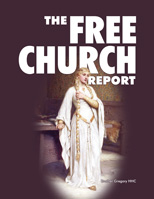Template:FCR: Difference between revisions
(Created page with "== '''The Free Church Report''' == left|180px The Free Church Report presents a unique path for the modern Church according the nature of the first centu...") |
|||
| Line 3: | Line 3: | ||
[[Image:BKFCR.jpg|left|180px]] | [[Image:BKFCR.jpg|left|180px]] | ||
The Free Church Report presents a unique path for the modern Church according the nature of the first century Church | The Free Church Report presents a unique path for the modern Church according the nature of the first century Church by explaining the duty and purposes of that institution appointed by Christ. While Rome declined under runaway inflation, corrupt government, martial law, and endless threats of war, the Christians found an alternative to the men who “called themselves [[Benefactors|benefactors]] but exercised authority one over the other.” | ||
The early Christian knew rights and responsibilities were indivisible. They sought the right to be ruled by God by taking back their responsibility, through the service of “called out” ministers who lived in the world, but not of it. Their government benefits came through a divine network instituted in their hearts and minds by faith, hope, and charity under the perfect law of liberty as their Qorban | The early Christian knew rights and responsibilities were indivisible. They sought the right to be ruled by God by taking back their responsibility, through the service of “called out” ministers who lived in the world, but were not of it. Their government benefits came through a divine network instituted in their hearts and minds by faith, hope, and charity under the perfect law of liberty as their Qorban of the unrighteous mammon failed the Roman society. [http://www.hisholychurch.org/order/orderfcr.php Order] | ||
Revision as of 11:29, 28 September 2015
The Free Church Report

The Free Church Report presents a unique path for the modern Church according the nature of the first century Church by explaining the duty and purposes of that institution appointed by Christ. While Rome declined under runaway inflation, corrupt government, martial law, and endless threats of war, the Christians found an alternative to the men who “called themselves benefactors but exercised authority one over the other.” The early Christian knew rights and responsibilities were indivisible. They sought the right to be ruled by God by taking back their responsibility, through the service of “called out” ministers who lived in the world, but were not of it. Their government benefits came through a divine network instituted in their hearts and minds by faith, hope, and charity under the perfect law of liberty as their Qorban of the unrighteous mammon failed the Roman society. Order